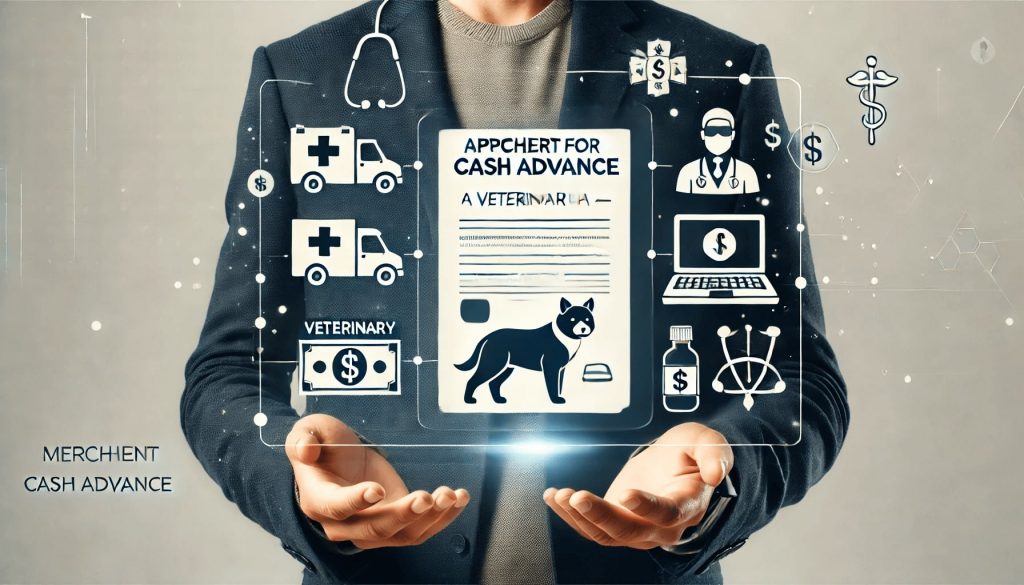
By alphacardprocess October 5, 2024
In today’s competitive business landscape, veterinary clinics often face financial challenges that can hinder their growth and expansion. Whether it’s investing in new equipment, hiring additional staff, or expanding their facilities, veterinary clinics require a steady flow of capital to meet their operational needs. However, traditional financing options such as bank loans may not always be readily available or suitable for these businesses. This is where merchant cash advances come into play.
A merchant cash advance is a type of financing that provides veterinary clinics with a lump sum payment in exchange for a percentage of their future credit card sales. Unlike traditional loans, merchant cash advances are not based on credit scores or collateral. Instead, they rely on the clinic’s credit card sales volume to determine eligibility and repayment terms. This article will delve into the details of merchant cash advances for veterinary clinics, including how they work, eligibility criteria, factors to consider before applying, benefits, and the application process.
What is a Merchant Cash Advance and How Does it Work?

A merchant cash advance is a financing option that allows veterinary clinics to access quick capital by selling a portion of their future credit card sales at a discount. The advance provider, also known as the funder, provides the clinic with a lump sum payment upfront, which is then repaid through a predetermined percentage of the clinic’s daily credit card sales. This repayment structure is known as a holdback or retrieval rate.
The holdback rate is typically a fixed percentage of the clinic’s daily credit card sales, ranging from 10% to 20%. For example, if a veterinary clinic generates $10,000 in credit card sales in a day and has a holdback rate of 15%, the funder will deduct $1,500 from the clinic’s daily sales until the advance is fully repaid. This repayment process continues until the agreed-upon amount, including the funder’s fees, is paid in full.
Eligibility Criteria for Veterinary Clinics to Obtain a Merchant Cash Advance
While merchant cash advances offer a flexible financing option for veterinary clinics, not all clinics may be eligible to obtain one. Lenders typically have certain criteria that clinics must meet to qualify for an MCA. Here are some common eligibility requirements:
- Minimum Credit Card Sales: Most lenders require veterinary clinics to have a minimum monthly credit card sales volume, typically ranging from $5,000 to $10,000. This ensures that the clinic has a steady stream of revenue to repay the advance.
- Time in Business: Lenders often require veterinary clinics to have been in operation for a certain period, usually at least six months to a year. This demonstrates the clinic’s stability and ability to generate consistent revenue.
- Credit Score: While credit scores are not the primary factor in determining eligibility for an MCA, some lenders may consider the clinic owner’s personal credit score as part of the evaluation process. However, even clinics with lower credit scores may still be eligible for a merchant cash advance.
- Ownership and Legal Status: Veterinary clinics must be legally registered and have a valid business license to qualify for an MCA. Additionally, the clinic owner must have full ownership or majority ownership of the business.
Factors to Consider Before Applying for a Merchant Cash Advance
Before applying for a merchant cash advance, veterinary clinic owners should carefully consider several factors to ensure it is the right financing option for their clinic’s needs. Here are some key considerations:
- Cost of Financing: Merchant cash advances often come with higher fees and interest rates compared to traditional loans. Clinic owners should carefully evaluate the total cost of financing and compare it to other available options to ensure it is financially feasible for their clinic.
- Repayment Terms: Unlike traditional loans with fixed monthly payments, MCAs are repaid through a percentage of the clinic’s daily credit card sales. Clinic owners should assess their cash flow and determine if they can comfortably manage the repayment structure without negatively impacting their operations.
- Impact on Credit Card Processing: Since MCAs are repaid through a percentage of credit card sales, clinic owners should consider the potential impact on their cash flow. If a significant portion of their revenue is allocated towards repayment, it may affect their ability to cover other expenses or invest in growth opportunities.
- Alternative Financing Options: While merchant cash advances offer flexibility, veterinary clinic owners should explore other financing options available to them. Traditional loans, lines of credit, or equipment financing may provide more favorable terms and lower costs, depending on the clinic’s specific needs.
Benefits of Merchant Cash Advances for Veterinary Clinics
Despite the higher costs associated with merchant cash advances, they offer several benefits that make them an attractive financing option for veterinary clinics. Here are some advantages:
- Quick Approval and Funding: Compared to traditional loans, MCAs have a faster approval process, with some lenders providing funding within a few days. This allows veterinary clinics to access the funds they need quickly, especially during emergencies or time-sensitive opportunities.
- No Collateral Required: Unlike traditional loans that often require collateral, MCAs do not put the clinic’s assets at risk. This can be beneficial for veterinary clinics that may not have valuable assets to pledge as collateral.
- Flexible Repayment Structure: The repayment structure of MCAs is based on a percentage of credit card sales, making it more flexible than fixed monthly payments. During slower periods, when credit card sales are lower, the repayment amount decreases, easing the financial burden on the clinic.
- No Impact on Credit Score: Since MCAs are not reported to credit bureaus, they do not directly impact the clinic owner’s credit score. This can be advantageous for clinic owners with lower credit scores who may have difficulty obtaining traditional loans.
How to Apply for a Merchant Cash Advance for Your Veterinary Clinic

Applying for a merchant cash advance for a veterinary clinic involves several steps. By following these steps, clinics can streamline the application process and increase their chances of approval. The key steps include:
- Research and Compare Funders: Veterinary clinics should research and compare different funders that offer merchant cash advances. It is essential to consider factors such as reputation, terms and conditions, fees, and customer reviews to select a reputable and reliable funder.
- Gather Required Documentation: Clinics should gather the necessary documentation to support their application. This typically includes bank statements, credit card processing statements, business tax returns, and identification documents.
- Complete the Application: Veterinary clinics need to complete the application form provided by the chosen funder. The application form will require information about the clinic’s business, financials, and credit card sales volume.
- Submit the Application: Once the application is complete, clinics should submit it to the funder along with the required documentation. Some funders may also require additional information or clarification during the application process.
- Review and Accept the Offer: After reviewing the application, the funder will provide an offer outlining the terms and conditions of the merchant cash advance. Clinics should carefully review the offer, including the repayment terms, fees, and any additional requirements.
- Sign the Agreement: If the offer meets the clinic’s requirements, they can proceed to sign the agreement. It is crucial to read the agreement thoroughly and seek legal advice if necessary to ensure a clear understanding of the terms and obligations.
- Receive Funds: Once the agreement is signed, the funder will transfer the approved funds to the clinic’s designated bank account. The clinic can then use the funds as needed to support their business operations.
FAQs
Q.1: What is the difference between a merchant cash advance and a traditional loan?
A merchant cash advance is based on a percentage of future credit card sales, while a traditional loan involves borrowing a fixed amount of money and repaying it over a specified period with interest.
Q.2: Can veterinary clinics with bad credit qualify for a merchant cash advance?
Yes, merchant cash advances are accessible to veterinary clinics with varying credit scores. Even clinics with bad credit can qualify for this type of financing.
Q.3: How long does it take to receive funds from a merchant cash advance?
The time it takes to receive funds from a merchant cash advance can vary depending on the funder and the application process. However, it is generally faster compared to traditional loans, with funds often being disbursed within a few days.
Q.4: Can veterinary clinics use the funds from a merchant cash advance for any purpose?
Yes, veterinary clinics have the flexibility to use the funds obtained through a merchant cash advance for various purposes, including purchasing equipment, expanding the clinic, hiring staff, or covering operational expenses.
Q.5: Are merchant cash advances regulated?
Merchant cash advances are not subject to the same regulations as traditional loans. However, it is essential for veterinary clinics to carefully review the terms and conditions of the agreement and seek legal advice if necessary.
Conclusion
Merchant cash advances offer veterinary clinics a flexible and accessible financing option to meet their operational needs. By understanding how merchant cash advances work, the eligibility criteria, factors to consider before applying, and the benefits they offer, veterinary clinics can make informed decisions about their financing options.
It is crucial for clinics to carefully evaluate their financial situation, compare different funding options, and consider the impact on their cash flow before applying for a merchant cash advance. With proper planning and research, veterinary clinics can leverage merchant cash advances to support their growth and success in the competitive veterinary industry.